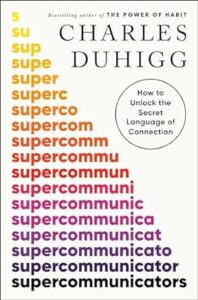Listening, Looping, Learning
By Amy Willis
If you were having a bad day, is there someone you could call who you just know would make you feel better? If you answered yes, chances are high that person is a supercommunicator.
What is a supercommunicator? In this episode, EconTalk host Russ Roberts welcomes author Charles Duhigg to talk about his eponymous book. Duhigg says communication is humans’ superpower; humans have built neural pathways specifically suited for communication. But what can we do to become better at it? Duhigg says there are simple skills that anyone can learn. Roberts found a lot of practical tips he can use from Duhigg’s book; we hope maybe you’ll get some you can use, too!

And don’t miss the question-based conversation toward the end, where Roberts and Duhigg each share their answers to such questions as, would you rather be rich or famous? What’s your perfect day? And more…
We of course also hope you’ll take a few moments to share your reactions to the questions below in the comments. And if you happen to use them in a class or dinner table conversation, we’d love to hear about that, too. You can always share with us at econlib@libertyfund.org. Here’s to a great conversation!
1- Duhigg identifies three different types of conversations/responses, and stresses that being able to identify which type you’re engaged in is crucial to becoming a supercommunicator. What are these types of communication, and what are the complementary ways in which you can exert control over the conversation? How does such control enable you to cooperate with the person you’re conversing with?
2- How does Duhigg describe the difference between debate and conversation? Why does Duhigg suggest that religion sees much more conversation, and very little debate? What do you think should be the goal of conversation?
3- Duhigg introduces Roberts to the practice of “looping,” which Duhigg argues helps you prove to your conversation partner that you are actively listening. What are the three steps of looping, and how does each work? How does Duhigg suggest that looping can serve as a “self-hack,” and to what extent are you convinced?
4- Roberts suggests that strategies such as looping may eliminate spontaneity from conversation. How does Duhigg respond? How might Duhigg’s notion of “deep questions” mitigate this challenge? (And what does their “Fast Friend” conversation at the end of the episode suggest?)
5- I want to repeat a question asked in the episode and get your reaction: Why don’t we teach communication any more? Where should it be taught?

